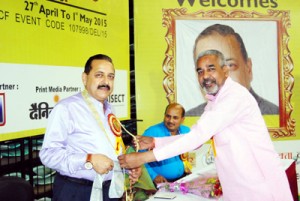Excelsior Correspondent

NEW DELHI, Apr 30: Government is seriously pursuing the “Whistle blowers Protection Act, 2011” and intends to reintroduce the Bill in the Parliament along with certain amendments.
Disclosing this in the Rajya Sabha here today, Union Minister of State (Independent Charge) of the Ministry of Development of North-Eastern Region (DoNER), MoS PMO, Personnel, Public Grievances, Pensions, Atomic Energy and Space, Dr Jitendra Singh said, the “Whistle blowers Protection Act” has gone through a peculiar fate over the last two years for which the present government cannot be held responsible.
Narrating the chronology of events, Dr. Jitendra Singh said, the Whistle blowers bill was first introduced in the Lok Sabha by the then UPA Government in 2010 and it was passed on December 27, 2011. Thereafter, when the Bill was brought in the Rajya Sabha, the then Leader of Opposition Arun Jaitley had suggested certain amendments which were, by and large, endorsed by all sections of the House. These included the incorporation of crucial provisions to provide for safeguard against any disclosures affecting the sovereignty, integrity and security of the Indian State. After incorporation of these amendments and its passage in the Upper House as per procedure, the Bill would have been required to be reintroduced in the Lok Sabha under new title, but somehow this was not done and contrary to what was expected, on February 21, 2014, the Bill was hurriedly passed in the Rajya Sabha and after the President’s assent, it became the Whistleblowers Protection Act, 2011, but without incorporating the crucial amendments relating to safeguards against disclosing information regarding security of Indian State. Soon after the present Government took over, it started the process of preparing a fresh Bill incorporating the required amendments so that the Bill could be reintroduced in the Parliament, he added.
Dr. Jitendra Singh said, the government is serious about pushing forward all the anti-graft and anti-corruption legislations which are pending and this is a part of the Prime Minister’s commitment to maximum governance which is free of corruption. Referring to Lokpal and Lokayukta Act, 2013, he said, the Bill is yet to be passed because the present Government has suggested several amendments including the provision to accept the leader of single largest opposition party as a Member in the Selection Committee of the Lokpal in the absence of Leader of Opposition in the Lok Sabha as is currently the situation. Similarly, there is also a sound suggestion to fix the term of the Jurist Member in the Selection Committee to three years.
Dr Jitendra Singh recalled that the Lokpal Bill was introduced by him in the Lok Sabha on December 18 last year during the winter session, but in reverence to the opinion expressed by Members of the House, the Bill was referred to a Standing Committee and is still awaiting the response.
Among the other Bills waiting to be tabled, Dr. Jitendra Singh referred to the “Prevention of Corruption (Amendment) Bill, 2013” for amending the “Prevention of Corruption Act, 1988” which was introduced in the Rajya Sabha by the previous government, but was later referred to Parliamentary Standing Committee which has submitted its report on February 6 last year with a number of recommendations. The Bill will now be introduced again after taking cognizance of a number of significant amendments which include introducing Section-17(a) instead of 6(a), thus making it mandatory to seek the government’s permission before proceeding against an official or a public servant regardless of the rank or level of the posting held by him. Another Bill in the pipeline is “Prevention of Bribery of Foreign Public Officials and Officials of International Organizations Bill”.
Later, speaking on the sidelines of a function held to commemorate the memory of nationalist ideologue Dr. K.B. Hedgewar, Dr Jitendra Singh said, the Government is aiming to eliminate corruption, but at the same time to avoid incorporating any such clause in anti-corruption laws which could kill the initiative of a competent officer or compel him to step aside from his official duty and adapt an evasive attitude.

